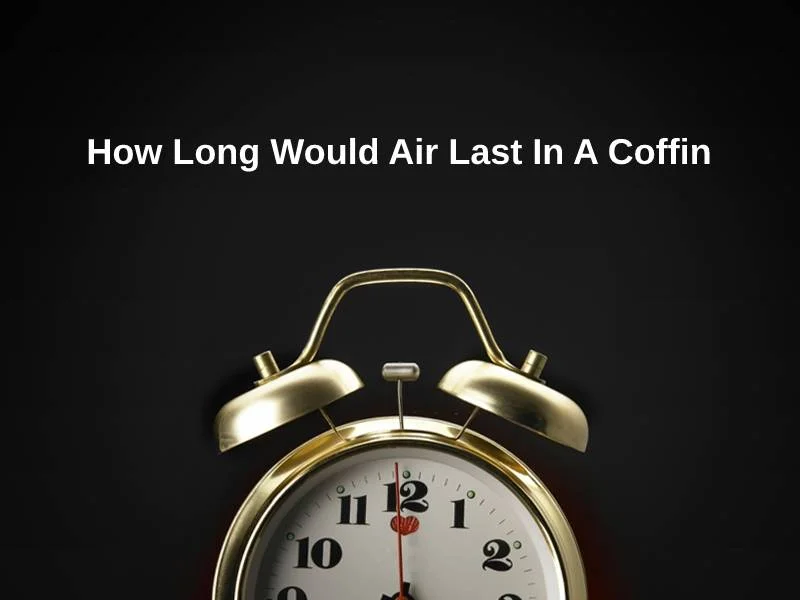Exact Answer: 1 to 8 Hours
Live burials are known to be one of the cruelest forms of bestowing death. Well-known magicians & escape artists perform tricks of escaping from live burials. If you are wondering about survival in a coffin after a live burial, then it is possible up until to a certain extent only. During the live burial, you would need oxygen to survive.
The oxygen required for survival is derived from the air entrapped in the coffin. One should note that coffins are sealed, and buried deep into the earth. The only way of breathing is through the oxygen in the entrapped air. Multiple factors influence the entrapped volume of air. The entrapped volume of air would approximately last for 6 hours if the average coffin size & average height of a person are to be considered.

How Long Would Air Last In A Coffin?
The volume of air entrapped in the coffin depends upon the size of the coffin. The larger the coffin size, the larger the volume of air gets entrapped. This effectively means that in a large coffin size, large volumes of air get entrapped.
Similarly, the height of a person also influences the volume of the air entrapped. The shorter the height of a person, the larger the volume of air gets entrapped. So, the individuals with shorter height will get a large volume of air entrapped in their coffin.
An average coffin holds a volume of around 900 liters. Considering the average human height, the volume occupied by an individual is 60 liters. This leaves a volume of 840 liters for the air to occupy. From this 840 liters of air, 175 liters of volume is occupied by oxygen.
Oxygen consumption rate depends highly upon the heart rate. If an individual is capable of maintaining a stable heart rate, then the oxygen consumption rate is around 0.5 to 0.6 liters per minute. At this rate of consumption, the oxygen that would last in a coffin is around 5 to 6 hours.
People who get panicked, frightened, and tensed consume oxygen at a higher rate. In such cases, the oxygen may get exhausted at a higher rate as the cells demand more oxygen. People with respiratory disorders may feel suffocated due to a lack of higher volumes of oxygen.
Individuals with experience in swimming, diving, high altitude trekking, mountaineering, and other such activities may be able to control their breathing. This gives them an extra hour or two before the oxygen is completely consumed.

| Air In The Coffin (Average Coffin Size) | Time |
| An average height healthy person | 5 to 6 Hours |
| A short healthy person | 6 to 7 Hours |
| A tall healthy person | 4 to 5 Hours |
| An individual who can control breathing & heart rate | 6 to 7 Hours |
| An individual who gets panicked & frightened | 3 to 4 Hours |
| An individual with respiratory & heart ailments | 1 to 2 Hours |
Why Would Air Last So Long In A Coffin?
Coffins are sealed & under the ground, buried in the soil. So, the air gets entrapped in the empty space of the coffin. Considering that the volume occupied by the air is limited, air lasts only for 4 to 7 hours (assuming average coffin size).
With time, the amount of oxygen goes on to decrease, the volume of carbon dioxide increases. The individual, then slowly falls into a state of coma. In the state of coma, oxygen consumption goes down.
The duration is highly dependent upon the oxygen consumption rate of an individual. So, a quick consumption of oxygen means that air won’t last long. Also, the height of the individual influences the volume occupied by the air. So, shorter height means that the volume of the air entrapped is higher.

People with respiratory ailments may not be able to cope up with the congested space & limited oxygen supply. Similarly, people with a weak heart may also give up a bit sooner due to higher oxygen consumption rates. Whereas, people who can hold on to their breaths and control their heart rates have more duration as they consume oxygen at a lower rate.
Conclusion
When we hypothetically assume that a person gets entrapped in a coffin, survival is completely dependent on the trapped oxygen. The volume occupied by the oxygen is influenced by factors like height of an individual, size of the coffin, oxygen consumption rate, and various other factors.